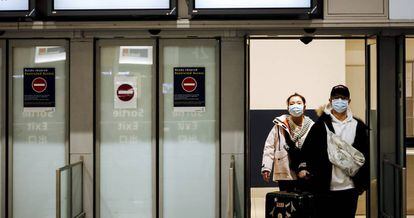
The 20 or so Spaniards who are trapped in the Chinese city of Wuhan due to the ongoing outbreak of the coronavirus 2019-nCoV are due to be repatriated in the coming days, most likely on the same planes that are being prepared by the French authorities to transfer the 500 or so of their compatriots who have been in the area since the epidemic began. That was according to the Spanish government spokesperson María Jesús Montero, who was speaking on Tuesday after the weekly Cabinet meeting.
“The [Spanish] Foreign Ministry and France are working closely together, although we may also join up with the units being managed by the United Kingdom,” Montero told reporters. “Once the decision has been made, all of the protocols will be activated so that they are transferred in an adequate manner, with all security guarantees.”
French citizens will be given priority on the repatriation flights
France is planning to charter its first plane on Thursday, and it will be used to move people with no symptoms of the virus. At least one more plane is planned for a future date to transfer French citizens who are sick.
The Spanish authorities have explained to its citizens trapped in Wuhan that they will be moved on one of these flights, although French citizens will be given priority.
Health Minister Salvador Illa explained on Monday during an interview with the Cadena SER radio network that his department was studying a plan to bring back the affected Spaniards. He would not be drawn on whether they would be placed in quarantine, but he stated that they would receive the “medical treatment that they need.” The ministry has not responded to questions from this newspaper about the specific measures that will be taken.
All accredited diplomats in Beijing have been summoned by the Chinese authorities
The evacuation plans are ongoing despite recommendations from the Chinese authorities that foreign nationals currently in the quarantined city of Wuhan stay put. All accredited diplomats in Beijing have been summoned by the Chinese authorities so that the details of the measures being taken to contain the outbreak can be explained, and to call for calm. Diplomatic sources have told Spanish news agency EFE that the Chinese authorities will not prohibit other countries from moving their citizens from Wuhan, but rather are trying to dissuade governments from doing so, given the risk that this could spread the virus further.
After meeting with the Chinese authorities, the director general of the World Health Organization, Tedros Adhanom Ghebreyesus, called on the international community to “keep calm” and not to react in an exaggerated fashion.
We’re feeling strong but it is true that as the days pass you start to have doubts, you start to think
Manuel Vela, a Spanish employee at the Chinese soccer club Wuhan Shangwen
Meanwhile, the Spanish citizens trapped in Wuhan expressed hope on hearing the news of the planned repatriations on Monday. “We’re feeling strong but it is true that as the days pass you start to have doubts, you start to think,” explained Manuel Vela, a Spanish employee at the Chinese soccer club Wuhan Shangwen. “Luckily we have our colleagues, and we are supporting one another.”
So far this new outbreak of the coronavirus has left 106 people dead and 4,515 confirmed cases. Among those who are infected, 515 are in a serious condition. The number of suspected cases is nearly 7,000, while a total of 45,000 people are under observation.
On Tuesday, the German authorities confirmed the first coronavirus infection in Europe in a patient who contracted the illness outside of China, reports Ana Carbajosa. Infections have also been confirmed to have taken place in Vietnam, Japan and Taiwan.
A new coronavirus
The current outbreak of what has been dubbed coronavirus 2019-nCoV causes symptoms that are similar to those of pneumonia, as well as fever and respiratory difficulties. Depending on the host patient, these symptoms can be light, serious or even fatal. Coronavirus are microorganisms that can easily mutate. It is thought that the virus passed to humans from a wholesale market stocking seafood and live and newly slaughtered animals in Wuhan, given that the vast majority of the first detected cases were among people who had been in that area. It is likely that the virus passed from a primary host, such as a bat, to another species due to adaptation or mutation, and from there was transferred to humans.
English version by Simon Hunter.
